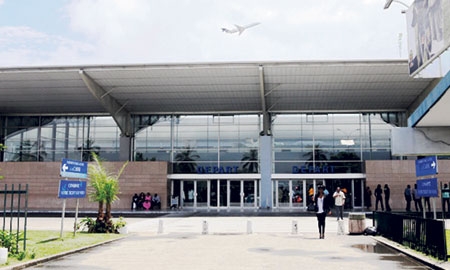According to the Transportation Minister, Gaoussou Touré, a fully integrative approach that unites all the different modes of public and private transport into a network of networks is at the heart of a master plan to ensure the country’s development as a regional hub. This plan, he says, has been endorsed by all major players in the transportation sector and they are “all committed to being fully involved in the implementation of that programme.”
“As a powerful tool for economic development, transportation occupies a prominent place in the programme of President Ouattara’s government,” the minister emphasises. “Transport in general and road transport in particular represent the backbone of our national development strategy.”
One of the biggest challenges facing Mr Touré and his associates calls for upgrading the national database that allows for monitoring of transport operations. Other public works projects include extensive dredging at Abidjan port that will allow for the construction of new quays, a grain terminal and a second container facility at what is already West Africa’s largest container port. Road congestion is likely to ease after the joint-venture Abidjan public transport authority SOTRA takes delivery of the 537 new buses it has been promised along with a large-capacity bus terminal.
Indeed, unlike many cities where creeping urban decay was allowed to get completely out of control, some serious forward planning made Abidjan a striking exception to the rule, with its extensive paved roadways, well connected residential and business districts, urban bypasses and water taxis plying the rivers and lagoons that converge on the city.
In 2013 foreign companies pledged $8.6 billion for new highways and rail links as well as expansion of the ports at
Abidjan and San Pedro. The Vridi Canal is scheduled for major upgrades and expansion that will make Abidjan the only West African deep-water port that can accommodate 25,000 to 50,000 tonne vessels. Completed originally in 1950, it was this canal that provided an outlet to the sea to what until then had been a fairly insignificant city on the rim of the Ebrie lagoon, by opening up a channel that slices through a sandbar nearly two miles long.
Last year, President Ouattara opened a highway linking Abidjan to the country’s political capital, Yamoussoukro. The time for roadwork improvement is now, Mr Touré rightly notes, as the upcoming cut in import duties on new automobiles, slashed from 51 to 12 per cent, is going to put a lot more cars on the road. The government is hoping Ivoirians will rush to acquire new vehicles to replace the more than 300,000 cars and trucks on the road that Mr Touré describes as “dangerous junk” with an average age of service of 20 years or more.
“As a powerful tool for economic development, transportation occupies a prominent place in the programme of President Ouattara’s government”
Gaoussou Touré, Minister of Transportation |
Lorries, a vital component of many African economies, will be directed to a new docking terminal being built for them at Adjamé, north of the city, that can handle up to 500 vehicles at a time, while the government implements a plan to regulate this notoriously ungovernable sector.
Côte d’Ivoire’s rail system is also set for some major updates affecting existing lines linking Abidjan to Niger via Tambao, as well as from San Pedro to Mali, via Man. In the west of the country, iron, manganese and nickel will be shipped to the port of San Pedro over new rail lines. A programme to exploit the under-utilised Abidjan-Lagos corridor will be put in place, which will help move goods and passengers and from Nigeria, Ghana, Togo and Benin.
Modernisation of Boigny Airport at Abidjan, the country’s largest, is already under way and by the end of the current year, will be able to handle Airbus A380 jumbo jets. By that time, too, the foundations should be in place for “Aérocité”, a combined residential and commercial development covering 450 hectares linked to the airport that will integrate multifunctional services and activities, including shops, hotels and exhibition halls.
The Transport Ministry has slashed airfares between Abidjan and Paris and is working to more than double the number of airlines serving the country’s economic hub from 10 to 22. If that sounds a tad ambitious, consider the success story behind Air Côte d’Ivoire, the new regional carrier in which the government holds a majority stake, with the rest of the capital provided by Air France and minority shareholders.
Just a little more than a year after its first commercial flight parted company with the tarmac on November 12 2012, flying from from Abidjan to Dakar, the national airline has shot up to first place in the tally of passenger numbers passing through Abidjan airport with two Airbus 319s and an Embraer 170, and with two Bombardier Q400s awaiting delivery. These aircraft are already servicing 13 regional destinations, with plans to soon add Freetown, Monrovia, Niamey, Lagos, N’Djamena and Kinshasa to the list.
“The creation of Air Côte d’Ivoire is the result of the Head of State’s wish to have a national airline which operates out of Abidjan, in order to open up the country and give links across the sub-region, so as to reposition Abidjan as an international hub,” says CEO René Décurey.
At present, the flag carrier schedules three internal flights, connecting Abidjan to San Pedro, Bouaké and Korhogo. “Our original goal was to service 25 destinations after two and a half years. After a year, we are preparing to start operations in 19 of those 25, and with 71 per cent occupancy, so we are very optimistic,” said Mr Décurey.
As regarding the future, Air Côte d’Ivoire’s CEO says, “The development of the Aérocité project, the city to be built around the airport, is most strategic for the development of the hub. By creating shopping malls, conference rooms, meeting rooms and training centres, this package will help theemergence of the hub, the airport and the city of Abidjan.”

0 COMMENTS